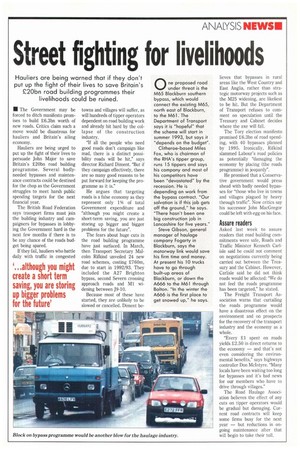Street fighting for livelihoods
Page 19

If you've noticed an error in this article please click here to report it so we can fix it.
Hauliers are being warned that if they don't put up the fight of their lives to save Britain's £20bn road building programmes their livelihoods could be ruined.
• The Government may be forced to ditch manifesto promises to build £6.3bn worth of new roads. Critics claim such a move would be disastrous for hauliers and Britain's ailing economy.
Hauliers are being urged to put up the fight of their lives to persuade John Major to save Britain's Z2Obn road building programme. Several badlyneeded bypasses and maintenance contracts could be destined for the chop as the Government struggles to meet harsh public spending targets for the next financial year.
The British Road Federation says transport firms must join the building industry and campaigners for bypasses in lobbying the Government hard in the next few months if there is to be any chance of the roads budget being spared.
If they fail, hauliers who battle daily with traffic in congested towns and villages will suffer, as will hundreds of tipper operators dependent on road building work and already hit hard by the collapse of the construction industry.
"If all the people who need good roads don't campaign like mad, there is a distinct possibility roads will be hit," says director Richard Diment. "But if they campaign effectively, there are so many good reasons to be put forward for keeping the programme as it is."
He argues that targeting roads is a false economy as they represent only 1% of total Government expenditure and "although you might create a short-term saving, you are just storing up bigger and bigger problems for the future".
The fears about huge cuts in the road building programme have just surfaced. In March, then Transport Secretary Malcolm Rifkind unveiled 24 new road schemes, costing £760m, due to start in 1992/93. They included the A27 Brighton bypass, second Severn crossing approach roads and M1 widening between J9-10.
Because most of these have started, they are unlikely to be slowed or cancelled. Diment be 0 ne proposed road under threat is the M65 Blackburn southern bypass, which would connect the existing M65, north east of Blackburn, to the M61. The Department of Transport says it is "hopeful" that the scheme will start in summer 1993, but says it "depends on the budget".
Clitheroe-based Miles Fox, who is chairman of the RHA's tipper group, runs 15 tippers and says his company and most of his competitors have been "devastated" by the recession. He is depending on work from the bypass contract. "Our salvation is if this job gets off the ground," he says. "There hasn't been one big construction job in Lancashire for five years."
Steve Gibson, general manager of haulage company Fogarty in Blackburn, says the motorway link would save his firm time and money. At present his 10 trucks have to go through built-up areas of Blackburn, or down the A666 to the M61 through Bolton. "In the winter the A666 is the first place to get snowed up," he says.
lieves that bypasses in rural areas like the West Country and East Anglia, rather than strategic motorway projects such as the M25 widening, are likeliest to be hit. But the Department of Transport refuses to comment on speculation until the Treasury and Cabinet decides where the axe will fall.
The Tory election manifesto promised Z6.3bn of road spending, with 40 bypasses planned by 1995. Ironically, Rifkind slammed Labour's road policies as potentially "damaging the economy by placing (the roads programme) in jeopardy".
He promised that a Conservative government would press ahead with badly needed bypasses for "those who live in towns and villages plagued by heavy through traffic". Now critics say his successor John MacGregor could be left with egg on his face.
Assure readers
Asked last week to assure readers that road building commitments were safe, Roads and Traffic Minister Kenneth Carlisle said he could not comment on negotiations currently being carried out between the Treasury and the Cabinet. However, Carlisle said he did not think roads would be affected: "We do not feel the roads programme has been targeted," he stated,
The Freight Transport Association warns that curtailing the roads programme would have a disastrous effect on the environment and on prospects for the recovery of the transport industry and the econemy as a whole.
"Every £1 spent on roads yields £2.50 in direct returns to the economy — and that's not even considering the environmental benefits," says highways controller Don McIntyre. "Many locals have been waiting too long for bypasses and it's bad news for our members who have to drive through villages."
The Road Haulage Association believes the effect of any cuts on tipper operators would be gradual but damaging. Current road contracts will keep some firms busy for the next year — but reductions in ongoing maintenance after that will begin to take their toll.
















































































